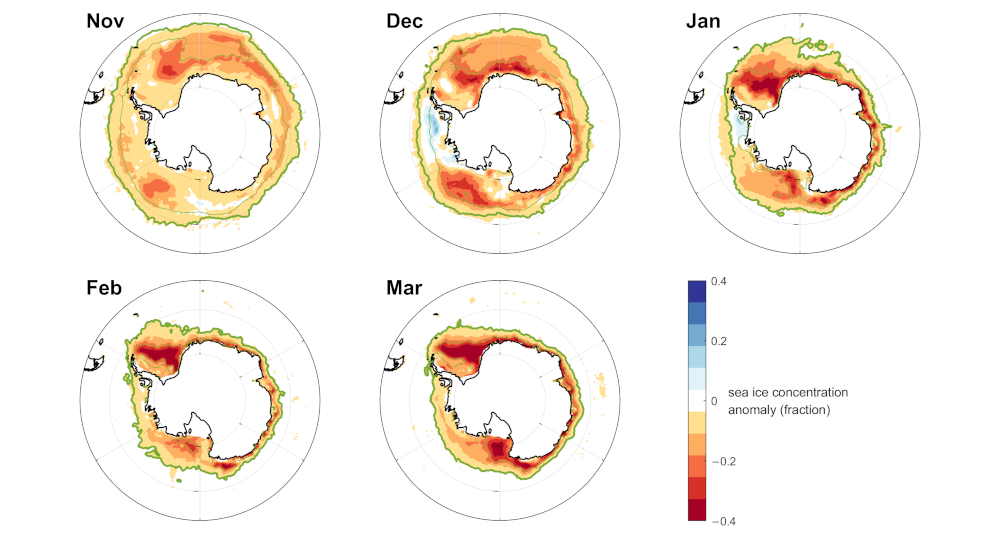- Acronimo
- IPSODES
- Codice
- 00199
- Anno
- 2018
- Area di ricerca
- Earth science
- Tematica specifica di ricerca
- Variabilità delle dinamiche dell'Oceano Meridionale
- Regione di interesse
- Oceano Meridionale
- Sito web progetto
- http://www.unive.it/ipsodes
- PI
- Davide Zanchettin
- Istituzione PI
- Università Ca' Foscari di Venezia
- Sito web istituzionale
- http://www.unive.it
- Altre Istituzioni e soggetti coinvolti
- Università di Napoli Parthenope, Consiglio Nazionale delle Ricerche - Istituto di Scienze Marine
- Consistenza del team ricerca
- Stato progetto
- Completato
- Stazioni principali usate
- Attività svolta in Italia
- Il progetto
The Southern Ocean (SO) dynamics, and the various fronts of the Antarctic Circumpolar Current in particular, are well known to display a very energetic variability covering a wide range of spatial and temporal scales. Since a substantial fraction of such variability is known to be intrinsic, and therefore basically chaotic, predictability in this part of the world ocean is particularly poor. In this context, the IPSODES project will investigate the predictability of the SO dynamics through ensemble simulation (ES) hindcasts analyzed by means of various statistical techniques supported by dynamical interpretations. Existing state-of-the-art eddy-permitting global ocean-sea-ice model ESs and coupled global atmosphere-ocean-sea-ice model ESs developed for decadal climate predictions will be used. Moreover, new ESs performed with a regional ocean model specifically developed for this project will also be carried out: sensitivity numerical experiments to assess model uncertainty will be performed with these new simulations. By improving our understanding of the predictability properties of oceanic variability, IPSODES will contribute toward more reliable predictions of the SO dynamics. This will in turn (i) contribute to enhance ocean modelling systems in the framework of the GIPPS, (ii) suggest improvements to the oceanic observational system, and (iii) provide further knowledge in support of coordinated research on interannual to decadal climate predictability and predictions (CMIP6-DCPP).
- Immagini
-
- Motivazione, importanza della ricerca
- Obiettivi della proposta
- Attività svolta e risultati raggiunti
- Prodotti
Articles/Articoli su riviste scientifiche
- Zanchettin, D., Modali, K., Müller, W. A., Rubino, A., Ross–Weddell Dipole Critical for Antarctic Sea Ice Predictability in MPI–ESM–HR, Atmosphere 2024, 15(3), 295;
- Aliani, S., Basurko, O.C., Arias, M., Isobe, A., Rubio, A., Topouzelis, K., and Cózar, A. (2022) Editorial: Marine Litter Windrows. Front. Mar. Sci. 8:827907. (50% PNRA-IPSODES)
- van Sebille, E., et al. (2020) The physical oceanography of the transport of floating marine debris Environ. Res. Lett., 15, 023003, (20% PNRA-IPSODES)
Book chapters/Capitoli di libro
- Suaria, G., Berta, M., Griffa, A., Molcard, A., Özgökmen, T. M., Zambianchi, E. and Aliani, S. (2022) Dynamics of Transport, Accumulation, and Export of Plastics at Oceanic Fronts. In: The Handbook of Environmental Chemistry. Springer, Cham, pp. 1-51. (35% PNRA)
- Belkin, I.M. et al. (2022). Introduction to the Chemical Oceanography of Frontal Zones. In: TheHandbook of Environmental Chemistry. Springer, Berlin, Heidelberg. (35% PNRA)
Abstracts and Proceedings in scientific conferences/Abstract e proceedings in conferenze scientifiche
- Zanchettin D., S, Pierini, S. Aliani, A. Rubino, E. Zambianchi, R. Viana Barreto, P. de Ruggiero, A. Colella, Predictability of the Southern Ocean dynamics through ensemble simulation hindcasts. “European Geosciences Union General Assembly 2022” (EGU 2022), abstract EGU22-2229, OS1.10, 25/05 Room L3
- Zanchettin D., S, Pierini, S. Aliani, A. Rubino, E. Zambianchi, P. de Ruggiero. Predictability of the Southern Ocean Dynamics Through Ensemble Simulation Hindcasts; “YOPP Final Summit”, Montreal, 29/08-1/09 2022
- Zanchettin D., K. Modali, W. Mueller, A. Rubino, On the predictability of Antarctic sea-ice concentration; Conferenza “THEMES 2022 - Oceanography and Climatology during the Pandemics: Threads Cut, Weaves to be Re-tied and New Horizons”, Venezia, 17-18 Dicembre 2022
- Colella A., P. de Ruggiero, S. Pierini, Modeling the intrinsic variability of the Antarctic Circumpolar Current; Conferenza “THEMES 2022 - Oceanography and Climatology during the Pandemics: ThreadsCut, Weaves to be Re-tied and New Horizons”, Venezia, 17-18 Dicembre 2022
- Pierini S., 2021. On the role of excitable systems in climate dynamics. International Conference SR40:1981-2021, forty years of Stochastic Resonance, Perugia, 13-15 September, 2021
- Aliani, S., UN Major Group statement for ISC at Intergovernmental Negotiating Committee to develop an international legally binding instrument on plastic pollution, including in the marine environment. Uruguay, December 2022
- Kara L., L. Law, S. Aliani, T. Mandel, N. Pujara, E. van Sebille, Physical Processes Governing the Distribution and Transport of Dispersed Particles in the Ocean - Ocean Sciences Meeting 2020, AGU
- Pierini S., 2022. Analisi dei cambiamenti climatici mediante la metodologia delle realizzazioni climatiche parallele. Seconda Conferenza Nazionale sulle Previsioni Meteorologiche e Climatiche, Bologna, 21-22 Giugno 2022
Database/dati
Sessions organized in international conferences/sessioni organizzate in conferenze internazionali
- “Polar regions - IPSODES session” at the international conference “THEMES2022 - Oceanography and Climatology during the Pandemics: Threads Cut, Weaves to be Re-tied and NewHorizons”, Venice 17-18 December 2022
